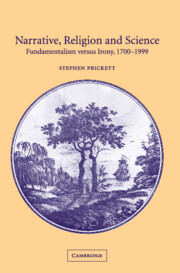Book contents
- Frontmatter
- Contents
- Acknowledgements
- Introduction: Arthur Dent, Screwtape and the mysteries of story-telling
- 1 Postmodernism, grand narratives and just-so stories
- 2 Newton and Kissinger: Science as irony?
- 3 Learning to say ‘I’: Literature and subjectivity
- 4 Reconstructing religion: Fragmentation, typology and symbolism
- 5 The ache in the missing limb: Language, truth and presence
- 6 Twentieth-century fundamentalisms: Theology, truth and irony
- 7 Science and religion: Language, metaphor and consilience
- Concluding conversational postscript: The tomb of Napoleon
- Bibliography
- Index
Introduction: Arthur Dent, Screwtape and the mysteries of story-telling
Published online by Cambridge University Press: 12 November 2009
- Frontmatter
- Contents
- Acknowledgements
- Introduction: Arthur Dent, Screwtape and the mysteries of story-telling
- 1 Postmodernism, grand narratives and just-so stories
- 2 Newton and Kissinger: Science as irony?
- 3 Learning to say ‘I’: Literature and subjectivity
- 4 Reconstructing religion: Fragmentation, typology and symbolism
- 5 The ache in the missing limb: Language, truth and presence
- 6 Twentieth-century fundamentalisms: Theology, truth and irony
- 7 Science and religion: Language, metaphor and consilience
- Concluding conversational postscript: The tomb of Napoleon
- Bibliography
- Index
Summary
In Douglas Adams' novel, Mostly Harmless, which appears as volume five of his increasingly inaccurately named trilogy, The Hitch-Hiker's Guide to the Galaxy, we find the following gnomic conversation between our nearest equivalent to a hero, Arthur Dent, and a mysterious old man who appears to be pole-squatting in another dimension on the planet Hawalius, on the outer Eastern Rim of the Galaxy. It is a planet inhabited almost entirely by oracles, seers and soothsayers – together with an inordinate number of take-away pizza shops, because most of these mystics were quite incapable of cooking for themselves. Here Arthur encounters a village composed entirely of extremely high poles surmounted by platforms. The majority turn out to be unoccupied, except for a liberal sprinkling of bird-droppings, but from one of them Arthur sees an old man on a neighbouring pole who, after a little persuasion, offers this explanation of nearly everything:
‘You cannot see what I see because you see what you see. You cannot know what I know because you know what you know. What I see and what I know cannot be added to what you see and what you know because they are not of the same kind. Neither can it replace what you see and what you know, because that would be to replace yourself.’
‘Hang on, can I write this down?’ said Arthur, excitedly fumbling in his pocket for a pencil.
‘You can pick up a copy at the spaceport,’ said the old man. […]
- Type
- Chapter
- Information
- Narrative, Religion and ScienceFundamentalism versus Irony, 1700–1999, pp. 1 - 13Publisher: Cambridge University PressPrint publication year: 2002



